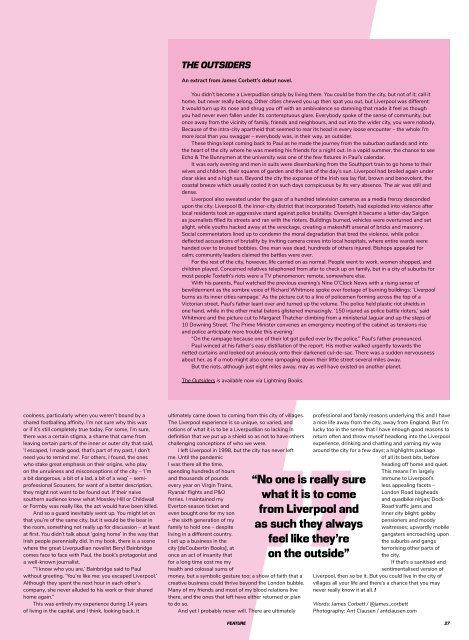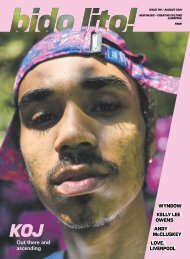Bido Lito! Magazine | Issue 114 | June 2021
Featuring: SPINN, IAMKYAMI, VASILY PETRENKO, LIVERPOOL FOOTBALL THERAPY, MONKS, SUPER COOL DRAWING MACHINE, CULTURAL SHIFT, JAMES CORBETT, STARKEY THE MESSENGER, THE LET GO, THE LOVELY EGGS, SHAME, WYLDEST, AND MORE.
Featuring: SPINN, IAMKYAMI, VASILY PETRENKO, LIVERPOOL FOOTBALL THERAPY, MONKS, SUPER COOL DRAWING MACHINE, CULTURAL SHIFT, JAMES CORBETT, STARKEY THE MESSENGER, THE LET GO, THE LOVELY EGGS, SHAME, WYLDEST, AND MORE.
Create successful ePaper yourself
Turn your PDF publications into a flip-book with our unique Google optimized e-Paper software.
THE OUTSIDERS<br />
An extract from James Corbett’s debut novel.<br />
You didn’t become a Liverpudlian simply by living there. You could be from the city, but not of it; call it<br />
home, but never really belong. Other cities chewed you up then spat you out, but Liverpool was different:<br />
it would turn up its nose and shrug you off with an ambivalence so damning that made it feel as though<br />
you had never even fallen under its contemptuous glare. Everybody spoke of the sense of community, but<br />
once away from the vicinity of family, friends and neighbours, and out into the wider city, you were nobody.<br />
Because of the intra-city apartheid that seemed to rear its head in every loose encounter – the whole I’m<br />
more local than you swagger – everybody was, in their way, an outsider.<br />
These things kept coming back to Paul as he made the journey from the suburban outlands and into<br />
the heart of the city where he was meeting his friends for a night out. In a vapid summer, the chance to see<br />
Echo & The Bunnymen at the university was one of the few fixtures in Paul’s calendar.<br />
It was early evening and men in suits were disembarking from the Southport train to go home to their<br />
wives and children, their squares of garden and the last of the day’s sun. Liverpool had broiled again under<br />
clear skies and a high sun. Beyond the city the expanse of the Irish sea lay flat, brown and benevolent, the<br />
coastal breeze which usually cooled it on such days conspicuous by its very absence. The air was still and<br />
dense.<br />
Liverpool also sweated under the gaze of a hundred television cameras as a media frenzy descended<br />
upon the city. Liverpool 8, the inner-city district that incorporated Toxteth, had exploded into violence after<br />
local residents took an aggressive stand against police brutality. Overnight it became a latter-day Saigon<br />
as journalists filled its streets and ran with the rioters. Buildings burned, vehicles were overturned and set<br />
alight, while youths hacked away at the wreckage, creating a makeshift arsenal of bricks and masonry.<br />
Social commentators lined up to condemn the moral degradation that bred the violence, while police<br />
deflected accusations of brutality by inviting camera crews into local hospitals, where entire wards were<br />
handed over to bruised bobbies. One man was dead, hundreds of others injured. Bishops appealed for<br />
calm; community leaders claimed the battles were over.<br />
For the rest of the city, however, life carried on as normal. People went to work, women shopped, and<br />
children played. Concerned relatives telephoned from afar to check up on family, but in a city of suburbs for<br />
most people Toxteth’s riots were a TV phenomenon: remote, somewhere else.<br />
With his parents, Paul watched the previous evening’s Nine O’Clock News with a rising sense of<br />
bewilderment as the sombre voice of Richard Whitmore spoke over footage of burning buildings: ‘Liverpool<br />
burns as its inner cities rampage.’ As the picture cut to a line of policemen forming across the top of a<br />
Victorian street, Paul’s father leant over and turned up the volume. The police held plastic riot shields in<br />
one hand, while in the other metal batons glistened menacingly. ‘150 injured as police battle rioters,’ said<br />
Whitmore and the picture cut to Margaret Thatcher climbing from a ministerial Jaguar and up the steps of<br />
10 Downing Street. ‘The Prime Minister convenes an emergency meeting of the cabinet as tensions rise<br />
and police anticipate more trouble this evening.’<br />
“On the rampage because one of their lot got pulled over by the police.” Paul’s father pronounced.<br />
Paul winced at his father’s easy distillation of the report. His mother walked urgently towards the<br />
netted curtains and looked out anxiously onto their darkened cul-de-sac. There was a sudden nervousness<br />
about her, as if a mob might also come rampaging down their little street several miles away.<br />
But the riots, although just eight miles away, may as well have existed on another planet.<br />
The Outsiders is available now via Lightning Books.<br />
coolness, particularly when you weren’t bound by a<br />
shared footballing affinity. I’m not sure why this was<br />
or if it’s still completely true today. For some, I’m sure,<br />
there was a certain stigma, a shame that came from<br />
leaving certain parts of the inner or outer city that said,<br />
‘I escaped, I made good, that’s part of my past, I don’t<br />
need you to remind me’. For others, I found, the ones<br />
who stake great emphasis on their origins, who play<br />
on the unruliness and misconceptions of the city – ‘I’m<br />
a bit dangerous, a bit of a lad, a bit of a wag’ – semiprofessional<br />
Scousers, for want of a better description,<br />
they might not want to be found out. If their naive<br />
southern audience knew what Mossley Hill or Childwall<br />
or Formby was really like, the act would have been killed.<br />
And so a guard inevitably went up. You might let on<br />
that you’re of the same city, but it would be the bear in<br />
the room, something not really up for discussion – at least<br />
at first. You didn’t talk about ‘going home’ in the way that<br />
Irish people perennially did. In my book, there is a scene<br />
where the great Liverpudlian novelist Beryl Bainbridge<br />
comes face to face with Paul, the book’s protagonist and<br />
a well-known journalist.<br />
“‘I know who you are,’ Bainbridge said to Paul<br />
without greeting. ‘You’re like me: you escaped Liverpool.’<br />
Although they spent the next hour in each other’s<br />
company, she never alluded to his work or their shared<br />
home again.”<br />
This was entirely my experience during 14 years<br />
of living in the capital, and I think, looking back, it<br />
ultimately came down to coming from this city of villages.<br />
The Liverpool experience is so unique, so varied, and<br />
notions of what it is to be a Liverpudlian so lacking in<br />
definition that we put up a shield so as not to have others<br />
challenging conceptions of who we were.<br />
I left Liverpool in 1998, but the city has never left<br />
me. Until the pandemic<br />
I was there all the time,<br />
spending hundreds of hours<br />
and thousands of pounds<br />
every year on Virgin Trains,<br />
Ryanair flights and P&O<br />
ferries. I maintained my<br />
Everton season ticket and<br />
even bought one for my son<br />
– the sixth generation of my<br />
family to hold one – despite<br />
living in a different country.<br />
I set up a business in the<br />
city [deCoubertin Books], at<br />
once an act of insanity that<br />
for a long time cost me my<br />
health and colossal sums of<br />
money, but a symbolic gesture too; a show of faith that a<br />
creative business could thrive beyond the London bubble.<br />
Many of my friends and most of my blood relations live<br />
there, and the ones that left have either returned or plan<br />
to do so.<br />
And yet I probably never will. There are ultimately<br />
“No one is really sure<br />
what it is to come<br />
from Liverpool and<br />
as such they always<br />
feel like they’re<br />
on the outside”<br />
professional and family reasons underlying this and I have<br />
a nice life away from the city, away from England. But I’m<br />
lucky too in the sense that I have enough good reasons to<br />
return often and throw myself headlong into the Liverpool<br />
experience, drinking and chatting and yarning my way<br />
around the city for a few days; a highlights package<br />
of all its best bits, before<br />
heading off home and quiet.<br />
This means I’m largely<br />
immune to Liverpool’s<br />
less appealing facets –<br />
London Road bagheads<br />
and quadbike ninjas; Dock<br />
Road traffic jams and<br />
inner city blight; gobby<br />
pensioners and moody<br />
waitresses; upwardly mobile<br />
gangsters encroaching upon<br />
the suburbs and gangs<br />
terrorising other parts of<br />
the city.<br />
If that’s a sanitised and<br />
sentimentalised version of<br />
Liverpool, then so be it. But you could live in the city of<br />
villages all your life and there’s a chance that you may<br />
never really know it at all. !<br />
Words: James Corbett / @james_corbett<br />
Photography: Ant Clausen / antclausen.com<br />
FEATURE<br />
27

















